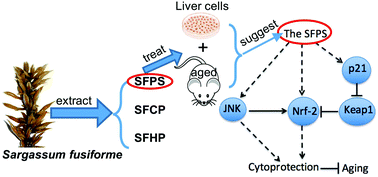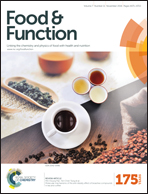Sargassum fusiforme polysaccharides activate antioxidant defense by promoting Nrf2-dependent cytoprotection and ameliorate stress insult during aging
Abstract
Aging is a complex issue, which results in a progressive decline process in cellular protection and physiological functions. Illustrating the causes of aging and pharmaceutical interference with the aging process has been a pivotal issue for thousands of years. Sargassum fusiforme (S. fusiforme), a kind of brown alga, is also named the “longevity vegetable” as it is not only a kind of food, but also used as an herb in traditional Chinese Medicine for maintaining health and treatment of thyroid disease, cardiovascular disease and so on. But how S. fusiforme promotes longevity is vastly equivocal. We got clues from S. fusiforme polysaccharides, which exhibited antioxidant activity, but the underlying mechanisms remained unclear. In this study, we evaluated the antioxidant effect and the possible mechanisms that S. fusiforme polysaccharides have against D-galactose-induced aging and chronic aging. We selected the SFPS as the candidate for antioxidant defense evaluation, which is a type of S. fusiforme polysaccharide with strong free radical scavenging activity and non-toxicity. It revealed that the antioxidant defense of the D-galactose-induced mice was markedly recovered when they were intragastrically administrated with the SFPS. However, oxidative damage may not be the only cause of aging. We further evaluated the function of the SFPS in the chronic aging mice. Intriguingly, we even found an obvious aging phenotype in the middle aged male ICR mice, which showed a significant decline in Nrf2-dependent cytoprotection. When 9-month old male ICR mice were treated with the SFPS for 2 months or even 11 months to their mean survival age, experimental measurements showed that the SFPS significantly promoted the antioxidant defense and mitochondrial integrity during aging. Furthermore, we suggest that the SFPS promotes Nrf2-dependent cytoprotection by upregulating the nuclear Nrf2 translocation, which may be mediated by p21 and JNK dependent pathways. These results suggest that the SFPS may decelerate the aging process by enhancing Nrf2-dependent cytoprotection, especially antioxidant defense.


 Please wait while we load your content...
Please wait while we load your content...